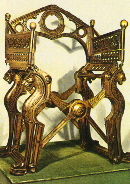
|
The first famous Carolingian general was Charles Martel, the son of Pepin of Heristal, who as mayor of the palace governed the decadent Merovingian kingdom. Charles grew up in the luxury of the court, even though he was the product of an illegitimate union. When Pepin died, however, Charlesís step-mother, Plectrude, had him imprisoned. He escaped, assembled his own army and began a series of military campaigns which were to make him the most powerful man in France.After fighting with mixed success against the Frisians, who occupied present-day Holland, Charles won a decisive victory over the Neustrians. The Neustrians, with whom the Merovingian kings had been allied, had recently humiliated Charlesís own region of Austrasia, which was to become the center of the empire under the Carolingians. Charles attacked the Neustrian forces as they were marching home in victory and defeated them.
The greatest challenge to the military skill of Charles Martel came from the Moslem invaders who had occupied the Iberian peninsula in 711. Aware of the weakness of the Frankish armies, the Moslems marched north of the Pyrenees in an open bid to seize control of Europe.
The duke of Aquitaine asked Charles for help. Charles mobilized the Frankish forces and, crossing the Loire River, confronted the Arab force near Poitiers. The Moslemsí strong point was a swift and well trained cavalry, while the men under Charles were grouped in infantry battalions. Both sides hesitated, taking seven days to weigh each otherís strength. Eventually the invaders, running short of supplies, were forced to attack. The Frankish infantry held, and as night fell the Moslems were returning towards Spain.
After the Frankish victory, the Moslems never again crossed the Pyrenees, and Charles Martel assumed supreme power in the kingdom.

|